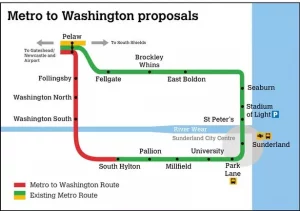
The recent Newcastle Climate Change Forum on 4th November, 2025, held at The Spark in Newcastle Helix, brought together key transport anchor institutions—Nexus, Stagecoach, and AECOM—to address the critical question of how the region is tackling climate change through improved public transport accessibility and sustainability. The event served as a crucial platform not only to present current efforts but also to gather feedback to help shape future policy and strategy on improving access and generating more sustainable journeys around the city and wider region. The presentations delivered a clear, unified message: the comprehensive shift towards electric and resilient transport infrastructure is not just a plan, but a substantial investment and engineering challenge already being met, requiring a holistic approach that balances environmental, social, and economic factors.
Nexus: Future-Proofing Rail Infrastructure and Assets
Nexus highlighted its ongoing, multi-layered commitment to maintaining and renewing its extensive asset portfolio. This infrastructure spans the full spectrum of public transport operations in the region, encompassing rail infrastructure—including track, signalling, and overhead lines—as well as bus infrastructure, facilities, estates, and power distribution systems. The challenge for Nexus Engineering lies in ensuring the long-term reliability and technical feasibility of these assets while integrating climate change preparedness into its capital works programme. Maintenance and renewal are strategically prioritised based on a multi-layered set of criteria including safety, compliance, urgency, risk, asset maturity, customer satisfaction, and sustainability.
The Metro to Washington Project: A Regional Link
The cornerstone future action detailed by Nexus is the proposed Metro to Washington project. This initiative is a proposed 13-kilometre extension to the Tyne and Wear Metro network, connecting existing stations at Pelaw and South Hylton via Washington. This ambitious project forms a key part of North East Mayor Kim McGuinness’ vision to transform local transport and create an integrated network spanning the region. The North East Combined Authority (NECA) have funded Nexus to develop an Outline Business Case (OBC).
The project is justified by its projected far-reaching benefits:
- Sustainability and Resilience: The extension is expected to reduce congestion, pollution, and carbon emissions. Furthermore, it provides passive provision for a future heavy rail service on the Leamside Line, significantly increasing the regional transport system’s long-term resilience.
- Access to Opportunity: It will offer Washington residents easier and faster access to education and leisure across Tyne and Wear, specifically mitigating travel-related social exclusion.
- Economic Growth: The route is strategically designed to connect residents from surrounding areas to two major job clusters: the Nissan/IAMP site and Follingsby.
The current project timeline is broken into three phases: Phase 1 (2023–2027) focuses on feasibility studies, outline design, and submitting the Outline Business Case (OBC); Phase 2 (2027–2030) involves procurement of contractors and new trains, and executing the land and consents strategy; with Phase 3 (2030 onwards) dedicated to detailed design, construction, fleet delivery, and commissioning.
Washington New Town: Addressing the Missing Link

Stagecoach: The Electric Shift
Stagecoach’s presentation directly confronted the question, “So, is electric really the future…?” by stating emphatically that “The future is here. And it is transformational”. The company is implementing an accelerated national electrification plan with the target of achieving a 100% electric fleet by 2035. Their interim target is for 50% of the fleet to be electric by 2029, estimating a significant reduction of 55 tonnes of carbon per bus. By March 2026, they plan to have 40 depots live and add 500 more Electric Vehicles to their fleet.
The strategy focuses on four key, multi-layered pillars for this massive transition:
- Electrification (Base): Securing necessary power connections, already achieved at over 69 of their sites.
- Scale Across Depots: Accelerating the rollout to depots across the company, adding EVs to sites including the North East’s Slatyford depot, which is entering service in September 2025.
- Optimise Energy: Defining a sophisticated power strategy to minimise energy costs through on-site solar generation and smart energy management.
- Increase ROI with B2B Charging: Maximising the utilisation of depot assets through a B2B model, opening charging hubs to third parties when buses are in service.
Customer Perception and Commercial Innovation
Stagecoach emphasised that the electric fleet alone doesn’t drive travel choice; customer experience does. Electric vehicles (EVs) are viewed by the public as more environmentally friendly, modern, progressive, and, importantly, more reliable than conventionally engine vehicles. EVs have less down-time due to having far fewer mechanical parts.
To capitalise on this, Stagecoach is investing in the passenger experience, including silent EV operation, Swisher interiors, enhanced seating, air conditioning, USB charging, and next stop announcements. This aims to deliver a step change from the traditional bus experience, aligning with customers’ rising expectations for quietness, comfort, and a premium feel.
Furthermore, the B2B charging strategy is being formalised with the creation of the “Chargd by Stagecoach” brand. A successful trial in Aberdeen with two Ikea fleet vehicles showed that opening charging infrastructure outside of peak bus service hours (9am–5pm) is viable. This trial involved 77 total sessions and over 3k kWh total consumption. The goal is a branded network of chargers, supported by a dedicated app, to enable users to find, charge, and pay for sessions, supporting both their own fleet and others (B2B and B2C) across the UK.
AECOM: The Engineering Pathway to Sustainability and Resilience
AECOM’s presentation focused on the ‘Engineering Behind Sustainable Transport Infrastructure’, delivered by Kirils Holstovs, Senior Engineer. The core message revolved around the necessity of a multi-layered, holistic consideration of sustainability in every infrastructure decision, recognising that transport infrastructure accounts for about 30% of UK and North East CO2 emissions (2024). The transport sector also faces challenges from aging infrastructure (tens of thousands of structures over 100 years old) and the impact of climate events such as high wind, flooding, and heavy rainfall.
The Three-Pillar Approach
Sustainable transport, according to AECOM, requires balancing three interconnected aspects:
- Economic: Infrastructure must be financially sustainable and resilient to financial pressures, supporting “green” economic growth and productivity growth.
- Social: It must be socially inclusive, connecting to opportunities, and affordable, reliable, and convenient. In the North East, 31% of residents are at risk of transport-related social exclusion.
- Environmental: Projects must be low carbon, adaptive, and resilient, while preserving biodiversity and improving air quality.
From Policy to Project Delivery
The path to creating sustainable infrastructure begins with international and national policy. This includes the Paris Agreement (aiming to limit global warming to $1.5^\circ\text{C}$) and the UK’s Climate Change Act 2008 (legally-binding Net Zero target by 2050). These mandates flow down through legally binding carbon budgets, government requirements, and client specifications, driving procurement and engineering standards such as PAS 2080.
AECOM champions Systems Thinking, where solutions are found that provide the best value for the overall network outcome—the interconnection of all physical facilities and human interactions—rather than merely optimising a single asset. A key takeaway is the carbon reduction hierarchy: Avoid, Switch, Improve. The principle is that ‘whole life carbon reduction is linked to whole life cost reduction’. The Northumberland Line was highlighted as a successful example, expected to bring more than £1.5 of quantified economic benefits for every £1 invested, while sustainably connecting communities and lowering emissions. The implementation of Blue Green Infrastructure (e.g., rain gardens, swales, and green roofs) was also shown as a way to integrate nature-positivity with resilience.
Looking Ahead and The Urgency of Political Will 🤝
The forum concluded with workshop sessions designed to engage stakeholders in shaping the region’s transport future. While the presentations established a clear engineering pathway and ambitious targets, follow-up discussions underscored the need for continued public and political pressure to implement these changes at the speed required to address climate change.
This sense of urgency is vital, given that the presentations reveal how delays risk increasing costs and compounding negative impacts:
- Cost of Delay to the Economy: Pushing back the delivery of crucial economic drivers like the Metro to Washington extension delays access to major job hubs (e.g., Nissan/IAMP and Follingsby) and postpones the realisation of calculated economic benefits, such as the £1.5 return for every £1 invested seen in projects like the Northumberland Line.
- Fiscal Responsibility: Delay in maintenance and adaptation projects erodes the principle of ‘whole life cost reduction’, making future resilience measures more expensive and financially less viable.
- Social Impact: Slow implementation prolongs travel-related social exclusion (affecting 31% of residents at risk) and extends the exposure of passengers and infrastructure to disruption caused by intensifying climate events, such as flooding and heatwaves.
The clear overarching message is that the North East’s transport future is being aggressively pursued through ambitious plans, but success requires an unwavering political commitment to ensure timely delivery and maximise the economic, social, and environmental benefits through a multi-layered approach.
I would like to add my thanks to the Nexus staff who assisted in providing information for this post.
Newcastle Climate Change Forum: Visit to the Helix Energy Centre
Our team at Climate Action Newcastle recently had the privilege of visiting the Helix Energy Centre on July 24, 2025, an insightful event hosted by Newcastle City Council. It was a fantastic opportunity for us, and other local stakeholders, to delve deeper into the city’s Heat and Energy Strategy and explore how we can collectively accelerate Newcastle’s decarbonisation efforts.
